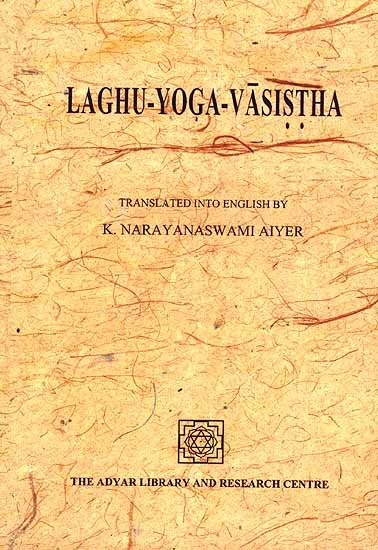Laghu-yoga-vasistha
by K. Narayanasvami Aiyar | 1896 | 137,618 words | ISBN-10: 818514141X | ISBN-13: 9788185141411
This page relates “the story of a bala (lad)”, the 7th part of chapter 3 of Laghu-yoga-vasistha (English translation). This ancient Sanskrit book contains epic legendry (similair to puranas and itihasa) and deals with the Advaita-vedanta (non-dual) branch of Indian philosophy. It is authored by sage (rishi) Valmiki and condensed (laghu) from an even larger work, forming a discourse between Vasistha (Vasishtha) and Rama. This part is included in the chapter “utpatti-prakarana”.
Part 7 - The Story Of A Bāla (Lad)
Summary. Through this story, it is sought to be shown that persons without Ātmic enquiry will see, as real this world which is nothing but of the nature of Saṃkalpa.
“The stainless mind of Jñānis is no other than the ever imperishable Brahman that has all Śaktis (potencies) and is ever full. Naught else is but that One. There is nothing which is not found in this Brahmic Reality. This indescribable Reality manifests itself as the many. Out of the infinite potencies in it, arises at one time one potency. This Jñāna Śakti of the stainless Brahman then manifests itself as in the perishable bodies. The different Śaktis producing fluctuation, hardness, heat, voidness, moisture and destructiveness in Vāyu, stone, fire, Ākāśa, water and Pralaya are no other than the one Brahmic potency latent in Brahman like trees in seeds. They appear multiform like the plants, etc., on this earth variegated by dint of time, space, etc. It is only the Brahmic Reality that is always and everywhere. It is only that Brahman which manifests itself as Manas through contemplation or as the Jīvātma subject to bondage or as the emancipated Paramātma as well as the universe and the many Śaktis in it. All the Vikalpas of the world seem to be as real to men as to a fickle child that in an old story is reported to have heard, as if true, all that her mother had narrated to her.”
At these words of Vasiṣṭha, Rāma of lotus-hands who was like a cloud raining his bounty upon all, wished to be acquainted with that story. Whereupon the Ṛṣi of rare Tapas began thus this story of mind’s illusions.
“A certain lad that had not yet attained discretion prayed to his mother to tell a tale for his diversion. Whereupon she related, as if true, the following entirely mythical story. Once upon a time three princes of unflinching bravery and good qualities resided in a city called Void. Of these three, two were never born and the third never went into any womb to be generated. These triumvirs bent upon the acquisition of all, rested in the forest of Ākāśa, full of countless fruits and having allayed their keen hunger by feeding themselves upon the delicious fruits therein, went on their way up. There they witnessed three rivers with dashing waves, winding their way on the out-skirts of that forest. Of these three rivers with speedy current, two had no water in them, while in the third the dry white sands were quite visible on its surface. In this last river they bathed and drank its waters. At sunset they retired to a town to rise thereafter (and not then in existence) and there built three houses. Of these three houses, two did not at all exist. The third one did not rejoice in the possession of any encircling walls or wooden superstructure. The three princes went to reside in these three contiguous houses without any wall (or support). These three persons who abode in the three buildings in an invisible town in the Ākāśa, found three golden vases by them there. Two were tiles only, while the third was a mere pulverized one. They deposited, in this formless vessel, a quantity of rice equal to 6 measures minus 10 measures and cooked the same. Having done so, they meted it out to innumerable mouthless Brahmins. After the Brahmins had thus filled their stomach to the brim, the three princes partook of the remaining meal as a God-send. Then delighting themselves with hunting and other pursuits, they spent their time most joyfully therein. When the mother thus concluded her story, her innocent child rested in the profound conviction of the genuineness of the mother’s tale. Similarly do the ignorant conceive and observe this world to be really existent. The expansion of this mind alone is Saṃkalpa; and Saṃkalpa, through its power of differentiation, generates this universe. Therefore, Oh Rāma, may you divest yourself of all Saṃkalpas and be a Nirvikalpa.”
